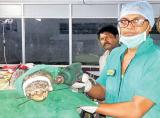Bidar, Oct 8: Perhaps, in one of the first instances of humans helping a reptile overcome a jaw injury it suffered after falling into a well, Bidar veterinarians have played good Samaritans or smart dentists, if one would like to call them so.
 Dr Shivaprakash, in-charge dean of the government veterinary college in this Hyderabad-Karnataka city, on Monday, took up the challenge not tried very often. The lower jaw of the scaly creature was sagging when it was brought to the operation theatre as it had suffered a mandible fracture.
Dr Shivaprakash, in-charge dean of the government veterinary college in this Hyderabad-Karnataka city, on Monday, took up the challenge not tried very often. The lower jaw of the scaly creature was sagging when it was brought to the operation theatre as it had suffered a mandible fracture.
Dr Shivaprakash said the animal looked pale due to the pain and it was suffering from dehydration. “We usually perform surgeries on animals like deer and black bucks. So, it was a bit perplexing in the case of the crocodile as to where to start things from, since it was a maiden attempt,” he said.
The veterinarians had to bank on their experience and knowledge in the absence of standard procedures. The croc was administered xylazine sedative and a dose of ketamine later as part of the anaesthesia procedure. The X-ray and electro cardiogram were taken before undertaking the one-and-a-half-hour exercise. The Kirschner wire was used to rejoin the fractured bones.
Inserting it in the creature’s mouth was the difficult part and it was not possible to do so using bone drills. The doctors had to order for a general drilling machine. Fibreglass band was used as the plaster, post-surgery.
C Renukaprasad, vice chancellor of the Veterinary University, Bidar, said it was a good opportunity for his faculty and students to learn.
The crocodile was spotted by local residents at Chalkapur village in Bhalki taluk and they informed the Forest department.
Umakanth, the deputy forest officer of the Halbarga range, and his team rescued the reptile. It was later shifted to the university for treatment. The animal is now at the Shahpur reserve forest. But the worry is that it has remained motionless and is yet to eat. Umakanth said the veterinarians had advised them to offer it fish or chopped meat. He said they would now try to feed it accordingly.





Comments
Add new comment